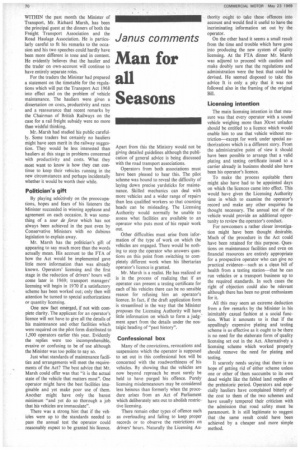Janus comments
Page 72

If you've noticed an error in this article please click here to report it so we can fix it.
Man for all Seasons
Apart from this the Ministry would not be giving detailed guidelines although the publication of general advice is being discussed with the road transport associations.
Operators from both associations must have been pleased to hear this. The pilot scheme was bound to reveal the difficulty of laying down precise yardsticks for maintenance. Skilled mechanics can deal with more vehicles and a wider range of repairs than less qualified workers so that counting heads can be misleading. The Licensing Authority would normally be unable to assess what facilities are available to an operator who puts most of his repair work out.
Other difficulties must arise from information of the type of work on which the vehicles are engaged. There would be nothing to stop the operator who answers questions on this point from switching to completely different work when his libertarian operator's licence is granted.
Mr. Marsh is a realist. He has realized or is in the process of realizing that if an operator can present a testing certificate for each of his vehicles there can be no sensible reason for refusing him an operator's licence. In fact, if the draft application form is streamlined in the way that the Minister proposes the Licensing Authority will have little information on which to form a judg-a ment apart from the details under the nostalgic heading of "past history".
Confessional box
Many of the convictions, revocations and suspensions which the operator is supposed to set out in this confessional box will be concerned with the roadworthiness of his vehicles. By showing that the vehicles are now beyond reproach he must surely be held to have purged his offence. Purely licensing misdemeanours may be considered less heinous than formerly when the procedure arises from an Act of Parliament which deliberately sets out to abolish restrictive licensing.
There remain other types of offence such as overloading and failing to keep proper records or to observe the restrictions on drivers' hours. Naturally the Licensing Au
thority ought to take these offences into account and would find it useful to have the incriminating information set out by the operator.
On the other hand it seems a small result from the time and trouble which have gone into producing the new system of quality licensing. At the FTA dinner Mr. Marsh was adjured to proceed with caution and make doubly sure that the regulations and administration were the best that could be devised. He seemed disposed to take this advice It is only a pity that it was not followed also in the framing of the original BiLL
Licensing intention
The main licensing intention in that measure was that every operator with a sound vehicle weighing more than 30ewt unladen should be entitled to a licence which would enable him to use that vehicle without restriction—except for work under special authorizations which is a different story. From the administrative point of view it should have been possible to arrange that a valid plating and testing certificate issued to a carrier already in business should also have been his operator's licence.
To make the process equitable there might also have had to be appointed days on which the licences came into effect. This would have given the Licensing Authority time in which to examine the operator's record and make any other enquiries he thought necessary_ The annual test of the vehicle would provide an additional opportunity to review the operator's conduct.
For newcomers a rather closer investigation might have been thought desirable. Much of the procedure in the Act could have been retained for this purpose. Questions on maintenance facilities and even on financial resources are entirely appropriate for a prospective operator who can give no practical evidence such as a clean bill of health from a testing station—that he can run vehicles or a transport business up to the required standards. In such cases the right of objection could also be relevant although there has been no great enthusiasm for it.
All this may seem an extreme deduction from a few remarks by the Minister in his inimitably casual fashion at a social function. What it amounts to is that if the appallingly expensive plating and testing scheme is as effective as it ought to be there is no need for the elaborate form of quality licensing set out in the Act. Alternatively a licensing scheme which worked properly should remove the need for plating and testing.
It scarcely needs saying that there is no hope of getting rid of either scheme unless one or other of them succumbs to its own dead weight like the fabled land reptiles of the prehistoric period. Operators and especially hauliers have complained bitterly of the cost to them of the two schemes and have usually tempered their criticism with the admission that road safety must be paramount. It is still legitimate to suggest that the same result could have been achieved by a cheaper and more simple method.
































































































































